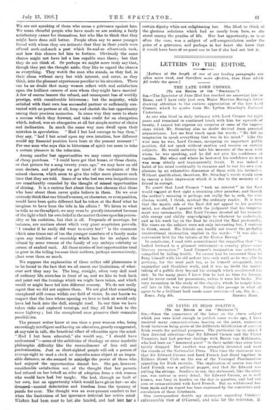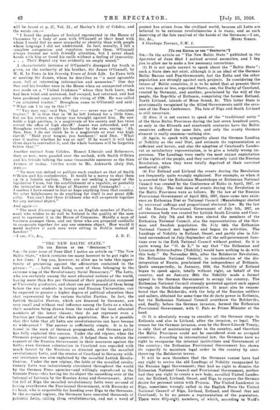ON LYING IN IRISH POLITICS.
[To THE EDITOR OF THE " SPECTATOR.") BM—Since the appearance of the letter on the above subject which you were kind enough to publish some weeks ago, 1 have received many communications bearing on the point, numerous fresh instances being given of the deliberate falsification of current Irish events for political purposes. The particular lie to which I then directed attention—that Sir Edward Carson and the Ulster Unionists had had pre-war dealings with Baron von Kithlmann, who had been an " honoured guest " in their midst—has since been tacitly dropped. But another was promptly invented and went the rounds of the Nationalist Press. This time the statement was that Sir Edward Carson and Lord French had dined together in Kildare Street Club on the eve of the Viceregal Proclamation appealing for Irish recruits. The implication of course was that Lord French was a political puppet, and that Sir Edward was pulling the strings. Needless to say, this statement, like the other one, was untrue in every detail. Sir Edward Carson, as is well known, was busy in London on the day in question, and had not seen or communicated with Lord French. But no withdrawal has been made and no regret has been expressed by the concocters and circulators of these falsehoods.
One correspondent doubts my statement regarding Cobden's
unfavourable view of O'Connell, and asks for the reference. It will be found at p. 27, Vol. II., of Morley's Life of Cobden, and the words are :-
" I found the populace of Ireland represented in the House of Commons by a body of men with O'Connell at their head with whom I could feel no more sympathy or identity than with people whose language I did not understand. In fact, morally, I felt a complete antagonism and repulsion towards them. O'Connell always treated me with friendly attention, but I never shook hands with him or faced his smile without a feeling of insecurity.
. . Their Repeal cry was evidently an empty sound."
A characteristic instance of O'Connell's disregard for truth is given, on the authority of his brother, Sir James O'Connell, by W. R. Le Fanu in his Seventy Years of Irish Life. Le Fanu tells of meeting Sir James, whom he describes as " a most agreeable man, full of interesting information and memories." One day Dan and his brother were in the House when an unexpected attack was made on a " United Irishman " whom they both knew, who had been tried and sentenced, had escaped, had returned, and had been pardoned some years after the rising of 1798. He was called " an attainted traitor." Brougham came to O'Connell and said : " What am I to say to this ? "
"
You may say,' said Dan, ' that — never was an " attainted traitor." It is true that in '98 he left Ireland for a little time, but on his return no charge was brought against him. He now holds a high position, is a magistrate of his county and has twice served the office of high sheriff.' James was astounded, and as Brougham retired, caught his brother by the arm, saying : Dan, Dan, I do not think he is a magistrate or ever was high sheriff.' Hold your tongue, you bo,sthoon! ' said Dan. ' What roes it matter whether he was or not? If he wasn't it will take three days to contradict it, and the whole business will be forgotten before t ha t.' "
Another extract from Cobden. Honest Liberals and Reformers, then as now, were puzzled over the outlook, with Smith O'Brien and his friends talking the same treasonable nonsense as the Sinn Feiners of to-day. Cobden wrote to Mr. Ashworth (July 21st, 1F.48) No man can defend or palliate such conduct as that of Smith O'Brien and his confederates. It would be a mercy to shut them 1:p in a lunatic asylum. They are not seeking a repeal of the legislative Union, but the establishment of a republic, or probably the restoration of the Kings of Munster and Connaught! . . . 1 confess I have ceased to fear or hope anything from that country. lts utter helplessness to do anything for itself is our great diffi- eulty. You can't find three Irishmen who will co-operate together for any national object."
And again :-
" The most discouraging thing to an English member of Parlia- ment who wishes- to do well to Ireland is the quality of the men sent to represent it in the House of Commons. Hardly a man of business amongst them, and not three who are prepared cordially to co-operate together for any one common object. How would it mend matters if such men were sitting in Dublin instead of London?



























 Previous page
Previous page